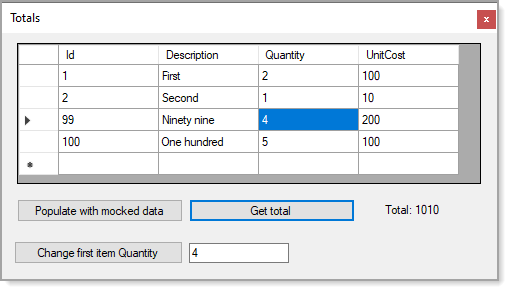Developer technologies | VB
An object-oriented programming language developed by Microsoft that can be used in .NET.
This browser is no longer supported.
Upgrade to Microsoft Edge to take advantage of the latest features, security updates, and technical support.
Hallo i have a BindingList of Work and i want to make one of the object instance is a total of all other object instances.
for example i have property "ID" , ID from 1 - 99 are reserved for calculating cost and instance with ID 100 is a sum of all. I would like to know how it is normally done or is there any alternative?
Public Class Work
Public Property ID As Integer
Public Property Description As String
Public Property Quantity As Integer
Public Property UnitCost As Integer
Public ReadOnly Property Cost As Integer
Get
Return GetCost()
End Get
End Property
Public Function GetCost() As Integer
Dim CalCost As Integer
Select Case ID
Case 1 To 99
CalCost = UnitCost * Quantity
Case 100 ''100 is the ID for Total
CalCost = Sum() Of Cost "totalcost"??? SUM of all Object In this collection
End Select
Return CalCost
End Function
End Class
Thanks

Hello,
It's best to keep the total logic outside of the Work class e.g.
Private _id As Integer
Private _description As String
Private _quantity As Integer
Private _unitCost As Integer
Public Property Id As Integer
Get
Return _id
End Get
Set
_id = Value
End Set
End Property
Public Property Description As String
Get
Return _description
End Get
Set
_description = Value
End Set
End Property
Public Property Quantity As Integer
Get
Return _quantity
End Get
Set
_quantity = Value
End Set
End Property
Public Property UnitCost As Integer
Get
Return _unitCost
End Get
Set
_unitCost = Value
End Set
End Property
Public Event PropertyChanged As PropertyChangedEventHandler Implements INotifyPropertyChanged.PropertyChanged
Protected Overridable Sub OnPropertyChanged(<CallerMemberName> Optional memberName As String = Nothing)
RaiseEvent PropertyChanged(Me, New PropertyChangedEventArgs(memberName))
End Sub
Public Overrides Function ToString() As String
Return $"Id: {Id} Description: {Description}"
End Function
For obtaining totals
Public Module Extensions
<Extension>
Public Function ToList(Of T)(collection As IEnumerable(Of T)) As List(Of T)
Return New List(Of T)(collection)
End Function
<Extension>
Public Function Total(sender As List(Of Work)) As Integer
Return sender.Where(Function(work) work.Id <= 99).Sum(Function(work) work.Quantity * work.UnitCost)
End Function
End Module
Public Class Form1
WithEvents mBindingSource As New BindingSource
Private mBindingList As New BindingList(Of Work)
Private Sub PopulateButton_Click(sender As Object, e As EventArgs) Handles PopulateButton.Click
Dim list As New List(Of Work) From {
New Work With {.Id = 1, .Description = "First", .UnitCost = 100, .Quantity = 2},
New Work With {.Id = 2, .Description = "Second", .UnitCost = 10, .Quantity = 1},
New Work With {.Id = 99, .Description = "Ninety nine", .UnitCost = 200, .Quantity = 1},
New Work With {.Id = 100, .Description = "One hundred", .UnitCost = 100, .Quantity = 5}
}
mBindingList = New BindingList(Of Work)(list)
mBindingSource.DataSource = mBindingList
DataGridView1.DataSource = mBindingSource
End Sub
Private Sub TotalButton_Click(sender As Object, e As EventArgs) Handles TotalButton.Click
If mBindingSource.DataSource IsNot Nothing Then
Dim total = mBindingList.ToList().Total()
TotalLabel.Text = $"Total: {total}"
Else
MessageBox.Show("No work items")
End If
End Sub
Private Sub ChangeButton_Click(sender As Object, e As EventArgs) Handles ChangeButton.Click
If mBindingSource.DataSource IsNot Nothing Then
Dim quantity As Integer
If Integer.TryParse(QuantityTextBox.Text, quantity) Then
mBindingList(mBindingSource.Position).Quantity = quantity
mBindingSource.ResetCurrentItem()
End If
Else
MessageBox.Show("No work items")
End If
End Sub
End Class
